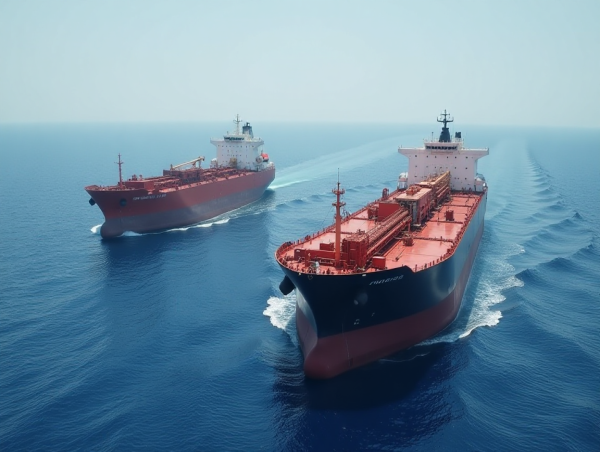Two oil tankers collided and caught fire on Tuesday near the Strait of Hormuz.
The incident occurred amid a surge in electronic interference in the region, attributed to the ongoing conflict between Iran and Israel, according to a Reuters report. No injuries to the crew or oil spillage were reported.
Twenty-four individuals were evacuated from the ship Adalynn to Khor Fakkan port by the United Arab Emirates coast guard, following the crash 24 nautical miles off the UAE’s eastern coast.
Frontline (FRO.OL), an Oslo-listed company and owner of the Front Eagle, reported that all personnel on board the second tanker were safe. A fire had occurred on the vessel’s deck, but no pollution was observed.
Navigational miscalculations between vessels
According to the monitoring service TankerTrackers.com, the Front Eagle was transporting 2 million barrels of Iraqi crude oil to Zhoushan, China.
The Suezmax-class tanker, Adalynn, owned by India’s Global Shipping Holding Ltd, was unladen and en route to Egypt’s Suez Canal, according to the monitoring service.
On X, TankerTrackers.com reported that the Front Eagle, traveling southbound at 13.1 knots, made a starboard (right) turn. This maneuver led to a collision with the Adalynn’s port quarter (aft port side), as the Adalynn was proceeding southeast at 4.8 knots.
“Based on the available data, this event does not appear to be a security incident related to regional conflicts or the result of electronic warfare targeting AIS/GPS signals from known interference sources such as Assaluyeh and Bandar Abbas, Iran,” TankerTrackers.com said in its X post.
It should be noted that, in addition to AIS, vessels utilize radar and radio communications for navigational coordination. The incident is most likely attributable to a misunderstanding or navigational miscalculation between the vessels involved.
This report shall be updated as additional satellite imagery and further details become available.
Strait of Hormuz remains crucial for oil trade
The Strait of Hormuz connects the Gulf to the northwest with the Gulf of Oman and the Arabian Sea to the southeast.
The already tense geopolitical landscape in the Middle East has been further destabilised by direct missile exchanges between Iran and Israel since Friday.
The unprecedented escalation has immediate and far-reaching consequences, particularly for global maritime trade and energy markets.
The significant disruption to navigation systems in the Strait of Hormuz and surrounding waters will be monitored closely in the coming days.
The vital sea route, situated between Iran and Oman, is a chokepoint through which approximately a fifth of the world’s total oil supply passes daily.
Navigational risks
Any interference with navigation — potentially due to GPS jamming or other electronic warfare tactics employed by one or both sides — poses a serious threat to the safety and efficiency of commercial shipping.
Tankers and cargo vessels relying on precise navigation are now forced to operate with heightened caution, increasing transit times and the risk of accidents.
Beyond the immediate navigational hazards, the escalating conflict casts a long shadow over global energy security.
Any sustained disruption or perceived threat to the flow of oil through the Strait of Hormuz could trigger a sharp spike in crude oil prices, impacting economies worldwide.
Insurers have already raised premiums for vessels operating in the region, further increasing shipping costs.
Daily flow of crude, condensate, and fuels ranged from approximately 17.8 million to 20.8 million barrels between early 2022 and last month, according to Vortexa data.
This week, the US-led Combined Maritime Force’s JMIC information center, a multinational entity, issued an advisory.
The advisory stated that reports of electronic interference had been received, originating from the vicinity of Iran’s Port of Bandar Abbas and other areas within the Gulf region.
In response to Western pressure, Tehran has previously issued threats to halt traffic in the strait.
The post Navigational error blamed for two oil tanker crash near Strait of Hormuz appeared first on Invezz




